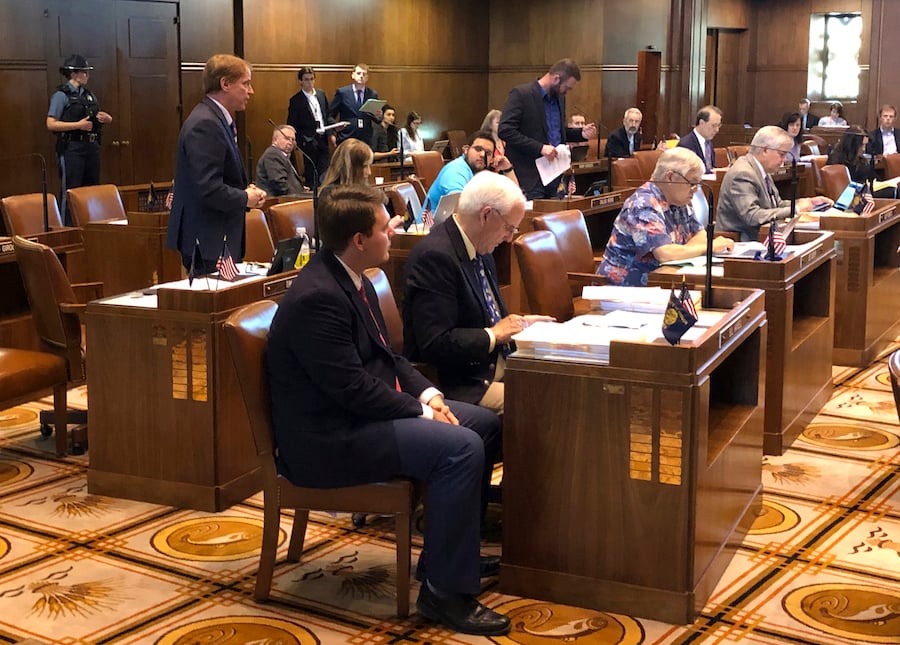PORTLAND, Ore. (CN) — Oregon senators who walked out of the state’s legislative session in 2023 are officially barred from reelection after the Oregon Supreme Court sided with the state’s reading of a voter-backed measure that punishes absentee lawmakers.
The Thursday morning ruling puts an end to speculation around the consequences of Ballot Measure 113, a constitutional amendment Oregonians passed in 2022 after three consecutive years of Republican-led walkouts at the Oregon Capitol.
The walkout tactic — deployed by members of both parties over the years — denies the state legislature quorum to decide on certain bills. The protests in 2019, 2020 and 2021, for example, prevented Oregon’s legislature from passing bills related to greenhouse cap-and-trade plans, vaccine and gun regulations and the former state governor’s regulations on Covid-19.
Measure 113 specifically disqualifies lawmakers who accrue 10 or more unapproved absences during a legislative session from holding office in the term immediately afterward. However, this didn’t prevent Republican senators from leading Oregon’s longest walkout yet the following year.
The 2023 boycott — spurred by two Democratic-backed bills involving reproductive rights and gun restrictions — resulted in the subsequent disqualification of ten Republican senators. That decision arrived in August 2023 when Oregon Secretary of State LaVonne Griffin-Valade issued a clarification for 2024 reelection requirements consistent with the intent of the Oregonians who voted for Measure 113.
Five of the disqualified Republican senators — Senate Republican leader Tim Knopp of Bend, Daniel Bonham of the Dalles, Suzzane Weber of Tillamook, Lynn Findley of Vale and Dennis Linthicum of Klamath Falls — petitioned the secretary’s order.
The senators challenging the measure believe there is a loophole in the law, as it says that those with more than 10 unexecuted absences cannot hold office "for the term following the election after the member's current term is completed," but elections for the office in the state are held before a lawmakers' term expires.
The petition was fast-tracked to the Oregon Supreme Court, which heard arguments from both sides on Dec. 14, 2023. That judge panel included Chief Justice Meagan Flynn and Justices Roger DeHoog, Rebecca Duncan, Chris Garrett, Stephen Bushong, Bronson James and Senior Justice Martha Walters.
The senators’ attorney, John DiLorenzo Jr. of Davis Wright Tremaine, offered the high court a lesson in grammar, arguing that there could be no other way to understand the measure’s language from the 2022 ballot. The justices disagreed on Thursday, writing that while the petitioners have a strong grammatical argument, the court must interpret the text with how voters would have understood it alongside accompanying ballot materials.
“Because the text is capable of supporting the secretary’s interpretation, and considering the clear import of the ballot title and explanatory statement in this case, we agree with the secretary that voters would have understood the amendment to mean that a legislator with 10 or more unexcused absences during a legislative session would be disqualified from holding legislative office during the immediate next term, rather than the term after that,” the panel wrote per curium.
Immediately following the decision, Griffin-Valade released a statement on how it has always been her intention to support the will of Oregon voters.
“It was clear to me that voters intended for legislators with a certain number of absences in a legislative session to be immediately disqualified from seeking reelection,” Griffin-Valade said. “I’m thankful to the Oregon Supreme Court for providing clarity on how to implement Measure 113.”
Two of the petitioning Republican senators reacted right away, as well.
“We obviously disagree with the Supreme Court’s ruling,” Knopp said. “But more importantly, we are deeply disturbed by the chilling impact this decision will have to crush dissent.”
Weber expressed disappointment while stating that she was unsurprised given that the justices were “appointed solely by Governor Brown and Governor Kotek would rule in favor of political rhetoric rather than their own precedent.”
“The only winners in this case are Democrat politicians and their union backers,” Weber added.
The remaining Republican senators impacted by the measure’s disqualification are Art Robinson of Cave Junction, Cedric Hayden of Fall Creek, Kim Thatcher of Keizer and Bill Hansell of Athena. All of the senators who are now disqualified from reelection missed between 20 and 32 legislative days in 2023.
Subscribe to Closing Arguments
Sign up for new weekly newsletter Closing Arguments to get the latest about ongoing trials, major litigation and hot cases and rulings in courthouses around the U.S. and the world.









